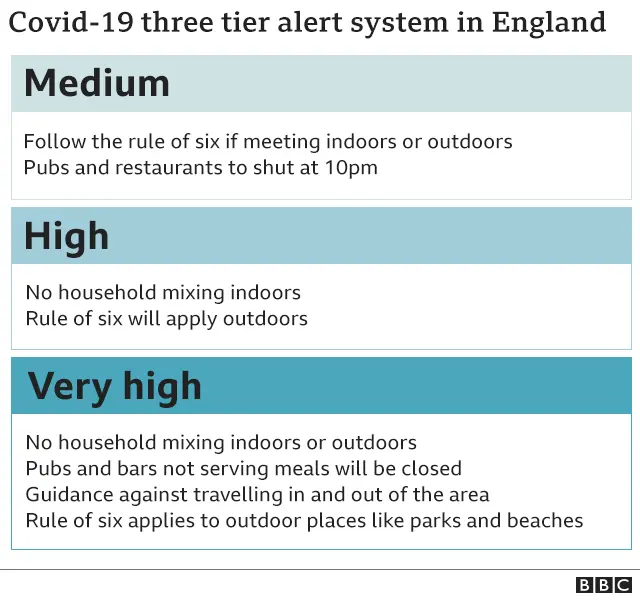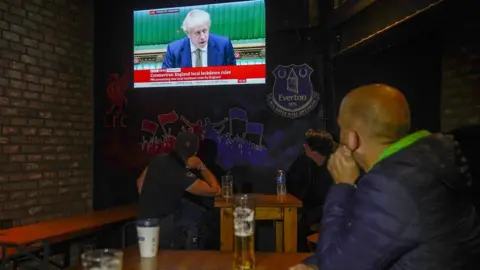Covid: Boris Johnson tells of 'dashboard warnings' over rise in cases
Boris Johnson has said the UK's increasing number of coronavirus cases is "flashing at us like dashboard warnings in a passenger jet".
The Liverpool region will be on a "very high" Covid alert level from Wednesday, the highest of a new three-tier system.
England's chief medical officer said he was not confident the measures "would be enough to get on top of" the virus.
Prof Chris Whitty said it was likely local authorities in "very high" alert areas would have to go further.
But the prime minister ruled out the "extreme route" of a national lockdown "right now".
Meanwhile, minutes from a meeting of the government's science advisors last month revealed they suggested a short national lockdown to curb virus cases.
Most areas of England will be on "medium" alert, with measures such as the rule of six, but areas with local restrictions on household mixing are automatically on "high" alert.
A "very high" alert sees pubs and bars close if they do not serve "substantial meals", almost all household contacts banned and advice against travel.
Mr Johnson said retail outlets, schools and universities would remain open in all areas of England.
Prof Whitty told a Downing Street news conference that, without additional local rules, the basic restrictions in very high alert areas would fail to control Covid-19.
However, Mr Johnson said the rules would be enough if they are implemented "very effectively". "We have to act now," he said.
It came after England's deputy chief medical officer, Prof Jonathan Van-Tam, said growth in Covid cases was a "nationwide phenomenon" and that "things are heating up" in areas beyond northern England.
And, as minutes from the government's scientific advisory group, Sage, show, recommendations made to ministers on 21 September included an immediate circuit breaker - or short lockdown - which was seen as the most effective way to suppress the virus.
They also reveal that the scientific advisers believe NHS Test and Trace is having just a "marginal impact" on the epidemic and this "will likely decline further" unless the system grows to keep pace with new cases.
Medium, high, very high
The new system is split into three alert levels: medium, high and very high. Most areas in England are in the medium alert level - meaning current restrictions continue, including the 10pm hospitality curfew.
Areas already under additional local restrictions are automatically in the high alert level - meaning bans on household mixing indoors are extended to include hospitality venues.
Nottinghamshire, East and West Cheshire and a small area of High Peak now come into this category, as well as Greater Manchester, parts of South Yorkshire, and north-east England. Around 4.4 million people will be in high alert areas.

The Liverpool City Region - home to 1.5 million people - becomes the first area to enter the very high alert level, with the closure of pubs and bars. Betting shops, gyms, leisure centres and casinos will also close in the region.
Household mixing will be banned anywhere indoors, and in outdoor gardens and hospitality. The rule of six will continue to apply in outdoor public spaces like parks, according to government guidance.
Restaurants can continue to trade in very high alert areas, while people will also be advised against travelling to and from these zones.
Speaking earlier in the House of Commons, he said: "This is not how we want to live our lives but this is the narrow path we have to tread between the social and economic trauma of a full lockdown and the massive human, and indeed, economic cost of an uncontained epidemic."
The PM said around £1bn of "new financial support" would be provided to local authorities in England with further financial support for local test and trace and local enforcement in very high alert areas. Mr Sunak also pointed towards the new post-furlough job support scheme.
A postcode search will launch on the government website in due course enabling residents to determine which rules apply to them, Mr Johnson said at the news conference.
 Getty Images
Getty ImagesLabour leader Sir Keir Starmer said: "The question today is whether the restrictions announced by the prime minister can bring the country back from the brink."
Prof Calum Semple, an infectious disease expert and adviser to the government, told BBC Radio 4's PM programme the new restrictions had come too late and a short national lockdown could be needed in weeks.
The British Medical Association, which represents doctors, said new local measures are "treating the 'symptom' not the cause" of increasing infections and called for a national prevention plan.

Go further or gone too far?

Some will say ministers should have gone further, while others argue they have already gone too far.
But the problem with the restrictions that are being discussed is that no one really knows what impact they will have.
Closing Covid-secure pubs, for example, could just drive people to gather more in homes, where the risk of transmission is even greater.
The other factor, which is not grabbing the headlines at the moment but is just as important, is whether the test and trace system is up to the job.
Test results are taking too long to return, contact tracers are failing to reach enough of the close contacts of infected individuals and even when they do most people do not follow the isolation guidelines to the letter.
Infections, hospitalisations and deaths are certainly going to rise. By how much and for how long is the big unknown.
Certainly with better treatments in place and the UK in a stronger position to protect care homes - four in 10 deaths were among their residents in the first wave - many believe the toll should not be as great as it was in the spring.

Labour mayor of Liverpool Joe Anderson told the BBC "we agree with the government having to impose tougher restrictions" but he added that an argument for a stronger financial package for the city "wasn't listened to".
Liverpool City Region metro mayor Steve Rotheram said the area's restrictions were "comparable" to the national lockdown in March - but without the same level of financial support.
Some areas of northern England have had additional restrictions on household gatherings since the end of July.
Meanwhile, London Mayor Sadiq Khan said despite the capital being on the medium alert level, its status could "change very quickly - potentially even this week" and move into a higher level.
The three-tier alert system applies only to England, with the devolved administrations in Scotland, Wales and Northern Ireland in charge of designing and implementing their own coronavirus restrictions.
A further 13,972 confirmed coronavirus cases were reported on Monday, with 50 more deaths within 28 days of a positive test recorded.

- SOCIAL DISTANCING: How have rules on meeting friends changed?
- FACE MASKS: When do I need to wear one?
- TESTING: How do I get a virus test?
- SYMPTOMS: What are they and how to guard against them?


Do you live in the Liverpool City Region? Do you work in the pub and hospitality industry? What would you like to ask our experts? Email [email protected].
Please include a contact number if you are willing to speak to a BBC journalist. You can also get in touch in the following ways:
- Tweet: @BBC_HaveYourSay
- Please read our terms & conditions and privacy policy
If you are reading this page and can't see the form you will need to visit the mobile version of the BBC website to submit your question or comment or you can email us at [email protected]. Please include your name, age and location with any submission.
